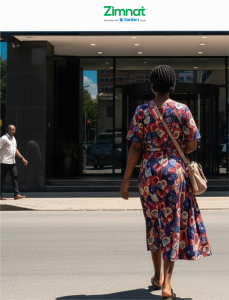The Price of Trust
When Familiar Faith Becomes Financial Risk
In Zimbabwe’s evolving investment landscape, trust is both our greatest strength and our biggest risk.
Every day, small acts of trust keep the economy moving from the kombi ride to the corner grocery. You hand over a US $1 note; the conductor gives you ZiG change without counting. You don’t check. Tomorrow, you’ll use the same notes for another ride. It’s an unspoken system built on habit and familiarity and it works because we’ve all kept our side of the bargain.
But as Zimnat Asset Management we believe the same reflex that keeps our streets running can quietly undo us when the stakes are financial. True prosperity demands that the same confidence we show in daily life be matched by verification when our money is at work
When Everyday Trust Becomes Costly
Post-COVID, many people found themselves rebuilding from scratch.
Side hustles multiplied. Savings circles grew. WhatsApp groups became the new financial frontier. The intention was honest to make money work harder. But some of these ventures traded on our instincts to believe the familiar.
The neighbour who once sold groceries now “trades forex.” A friend invites you to a “short-term investment club.” Someone shares screenshots of payouts that look convincing enough.
And just like that, trust becomes currency until it costs us.
Fast Returns Are the First Red Flag
Real investments take time because they’re bound by process audited, regulated, and reviewed. There’s paperwork, oversight, and sometimes delays. That’s what makes them safe.
Scams, on the other hand, rely on speed. They want you to act before you think.
They promise “guaranteed” returns, create fear of missing out, and flash early-bird success stories to draw you in.
If profits appear faster than they can logically grow, that’s not efficiency, it’s engineering.
Five Simple Checks That Protect You
- Confirm the licence. Always verify with the Securities and Exchange Commission of Zimbabwe (SECZ) or relevant regulator.
- Interrogate the returns. If the numbers look too good, they probably are.
- Watch the structure. If earnings depend on recruiting others, it’s a pyramid scheme.
- Insist on documentation. Legitimate investments leave a paper trail, not just a chat thread.
- Know the law. The Environmental Management Agency (EMA) has banned unregulated alluvial mining sponsorships. “Helping miners” can expose you to penalties, not profits.
Why Trust Needs Boundaries
Trust is a social strength; it keeps communities alive. But in finance, trust without verification becomes vulnerability.
It’s not cynicism to ask questions; it’s stewardship.
Responsible investors don’t assume; they confirm.
The same confidence that lets us pass a kombi conductor change without counting should be matched by discipline when the stakes are higher.
Accountability Is the New Confidence
Safe investing isn’t fast, but it’s firm.
It means your money is managed by licensed professionals, held by custodians, and governed by transparent reporting. It’s the kind of system that lets you sleep at night and plan years ahead.
That’s what genuine prosperity looks like not luck, not shortcuts, but structure.
Trust is one of Zimbabwe’s most valuable currencies. We live by it, trade through it, and rebuild with it.
But when it comes to investing, trust should never travel alone. Pair it with verification, and your faith becomes protection.
Because in finance, the price of blind trust is always higher than the promise of fast returns.
About Zimnat Asset Management
Zimnat Asset Management is a licensed investment manager under the Securities and Exchange Commission of Zimbabwe. It is a member of the Masawara Holdings group of companies. We advocate for transparent, accountable investing that protects and grows the wealth of Zimbabweans who choose to plan with care and confidence.
28 October 2025
She Vanished with $4,250, And the WhatsApp Group Went Dead Silent
The Day the WhatsApp Group Went Quiet
It started with a voice note.
"Guys, I think Mai Tadiwa has blocked me."
Then silence.
It was a Friday.
The group chat was supposed to light up with fire emojis and “Mari yapinda!” messages. For three months, the group had been buzzing. A savings club of 17 women, pooling money every Friday. It was Chipo’s turn to receive the payout $250 from each of the 17 women in the WhatsApp savings club. She had already told her landlord she’d pay rent that afternoon.
But the treasurer, Mai Tadiwa, didn’t send the money.
She didn’t reply to messages.
She didn’t answer calls.
No one saw it coming. But everyone felt it.
By Sunday, her WhatsApp profile photo was gone. Her number was unreachable. And the group chat, once filled with laughter, prayer requests, and daily hustle updates went dead silent.
The group had started innocently. A few women from the same church, some from the same kombi route, others who met at the market. They called it “Sisterhood Savings.” No constitution. No receipts. Just trust.
Each week, they had contributed. Each week, someone got their payout. Until Mai Tadiwa held the pot!
She held it for three weeks.
Then she vanished.
Chipo borrowed money to pay rent. Rumbidzai, who had planned to buy stock for her tuckshop, had to cancel her order. One woman cried in the group chat. Another cursed. A few left the group.
But most stayed. Not because they believed Mai Tadiwa would return. But because they didn’t know what else to do.
This isn’t just one group. It’s thousands.
Across Zimbabwe, informal savings clubs maround, stokvels, WhatsApp mukando are the backbone of community finance. They’re built on trust, speed, and the belief that “we know each other.”
But when they collapse, there’s no regulator. No insurance. No refund.
Just silence.
The Safer Way Forward
Zimbabwe has institutions designed to protect your money:
- IPEC ensures your insurance policy pays out when life hits hard.
- DPC guarantees your bank savings, even if the bank folds.
- SECZim regulates investments so your money doesn’t vanish into a pyramid.
These aren’t just acronyms. They’re shields. They’re the difference between a setback and a collapse.
After the group loss, some members stopped saving altogether. Others joined new rounds, hoping for better luck. But Chipo did something different.
She walked into a Zimnat branch.
She asked questions. She opened a Unit Trust account. She bought a funeral policy. She started saving not just with hope, but with structure.
“I still believe in people,” said one. “But now I also believe in systems.”
If you’re in a savings group, ask: Is it registered? Is it protected? Is there a paper trail?
Because when the money disappears, screenshots won’t save you.
If you’re saving money, planning for your kids, investing in your hustle, do it with protection. Do it with receipts. Do it with regulators who answer when things go wrong. Because the day the WhatsApp group goes quiet, you’ll want more than trust. You’ll want a trail.
Is it important to have funeral insurance in Zimbabwe?

The answer is YES.
The economic challenges that we face have seen a shrinkage in most household disposable incomes. Many people have been forced to reprioritize their expenses, and one of the most common "budget cuts" is directed toward funeral insurance expenses. Whilst this makes sense in the short term as this frees up some cash for the household, it creates an opportunity for doubt and uncertainty due to the lack of a financial safety net in the unfortunate event of a death in the family.
As a funeral insurance service provider our advocacy for funeral insurance coverage may appear self-serving, however, the reality still exists that funeral insurance is a necessary expense that should be kept in the budget. The following article breaks down what you need to know about how a funeral insurance premium is a good financial investment that helps you "save."
What is a funeral insurance cover in the first place?
Funeral insurance cover is a form of insurance that pays a specified amount of money in the event of a death, ensuring that the costs of a funeral will be covered so that family members do not have to struggle financially at this difficult time.
- Funeral insurance works in much the same way as other types of insurance. You decide how much funeral cover you want to buy and then you pay a monthly premium.
- You choose who to cover.
- Some funeral insurance policies also give you other benefits like burial repatriation, grocery benefits, or cash back.
- If you or your loved ones die, the money is paid out.
- A decision to take out funeral insurance should form part of a proper financial plan.
Gadziriro/Lungiselelo Funeral Plan also gives you more coverage and more choices at an affordable premium. You can choose the features and level of coverage you and your family need and can afford, and there’s the option of a savings benefit.
More cover
- Cover of up to US$5 000
- Premium holidays (you are exempted from paying premiums)
- Cover for up to 6 family members
- No medical or blood tests required
- Funeral cover that pays out in 48 hours
More choice
- Choose between individual and family packages
- Choose who you want to cover
- Choose how much you want to pay
- Choose the plan that’s right for you
Get covered against the financial burden of a funeral today. Sign up for Gadziriro/Lungiselelo Funeral Cash Plan






